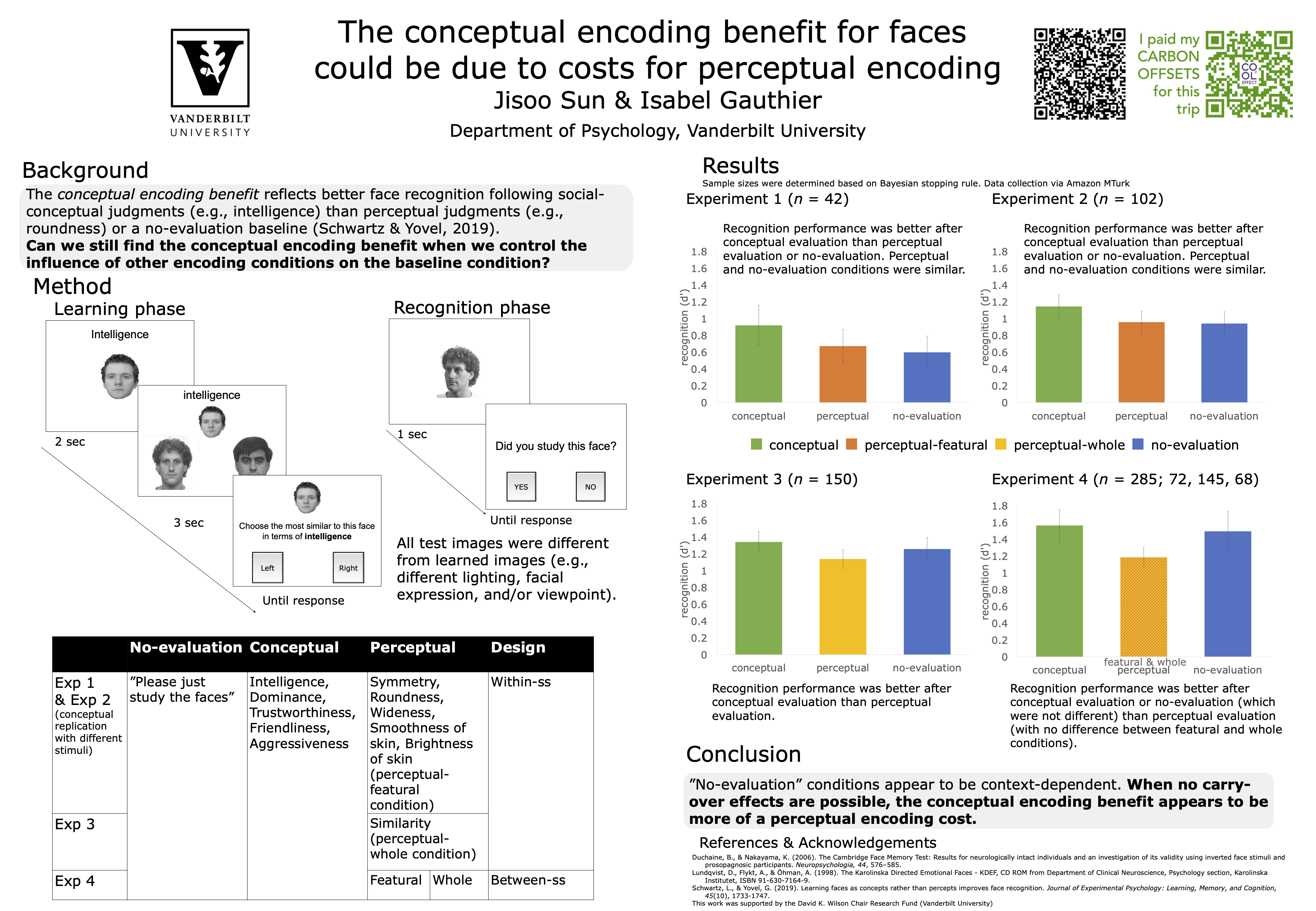The conceptual encoding benefit for faces could be due to costs for perceptual encoding
 When viewing a face, we can attend to different information, including perceptual and social-conceptual characteristics. Recent work proposed a “conceptual encoding benefit”, with better face recognition following social-conceptual judgments (e.g., trustworthiness) than perceptual judgments (e.g., wideness) or a no-evaluation baseline (Schwartz & Yovel, 2019). These effects were replicated several times in within-subject designs. Here, we consider the possibility that performance in the baseline condition is influenced by the other encoding conditions, complicating interpretation. In experiment 1, participants learned new faces presented as a pair and compared them to a reference in terms of either perceptual or socio-conceptual characteristics (e.g., which is most similar to the reference in terms of intelligence?). In the no-evaluation condition, participants studied the face pairs without additional instruction. Participants made different judgments based on instructions for each trial in the learning phase (within-subjects design). New images (different viewpoints, lighting) of studied individuals were presented in the test phase to ensure recognizing facial identity. At test, we found strong support for better recognition following socio-conceptual judgments than perceptual judgments. We replicated the conceptual encoding benefit in two other within-subject variations of this design (Experiments 2&3). When encoding conditions were compared between-subjects (Experiment 4), socio-conceptual judgments again led to better recognition than perceptual judgments. However, we found evidence that recognition following socio-conceptual judgments was equivalent to receiving no-evaluation instructions, while perceptual judgments led to poorer recognition than baseline. Thus, socio-conceptual encoding may not provide a true benefit over baseline. Instead, perceptual encoding instructions appear to hinder face recognition relative to a no-evaluation baseline. We find no-evaluation conditions to be context-dependent. How participants encode faces during baseline is difficult to ascertain, but the cost/benefit of different instruction conditions should be assessed in between-subjects designs.
When viewing a face, we can attend to different information, including perceptual and social-conceptual characteristics. Recent work proposed a “conceptual encoding benefit”, with better face recognition following social-conceptual judgments (e.g., trustworthiness) than perceptual judgments (e.g., wideness) or a no-evaluation baseline (Schwartz & Yovel, 2019). These effects were replicated several times in within-subject designs. Here, we consider the possibility that performance in the baseline condition is influenced by the other encoding conditions, complicating interpretation. In experiment 1, participants learned new faces presented as a pair and compared them to a reference in terms of either perceptual or socio-conceptual characteristics (e.g., which is most similar to the reference in terms of intelligence?). In the no-evaluation condition, participants studied the face pairs without additional instruction. Participants made different judgments based on instructions for each trial in the learning phase (within-subjects design). New images (different viewpoints, lighting) of studied individuals were presented in the test phase to ensure recognizing facial identity. At test, we found strong support for better recognition following socio-conceptual judgments than perceptual judgments. We replicated the conceptual encoding benefit in two other within-subject variations of this design (Experiments 2&3). When encoding conditions were compared between-subjects (Experiment 4), socio-conceptual judgments again led to better recognition than perceptual judgments. However, we found evidence that recognition following socio-conceptual judgments was equivalent to receiving no-evaluation instructions, while perceptual judgments led to poorer recognition than baseline. Thus, socio-conceptual encoding may not provide a true benefit over baseline. Instead, perceptual encoding instructions appear to hinder face recognition relative to a no-evaluation baseline. We find no-evaluation conditions to be context-dependent. How participants encode faces during baseline is difficult to ascertain, but the cost/benefit of different instruction conditions should be assessed in between-subjects designs.
